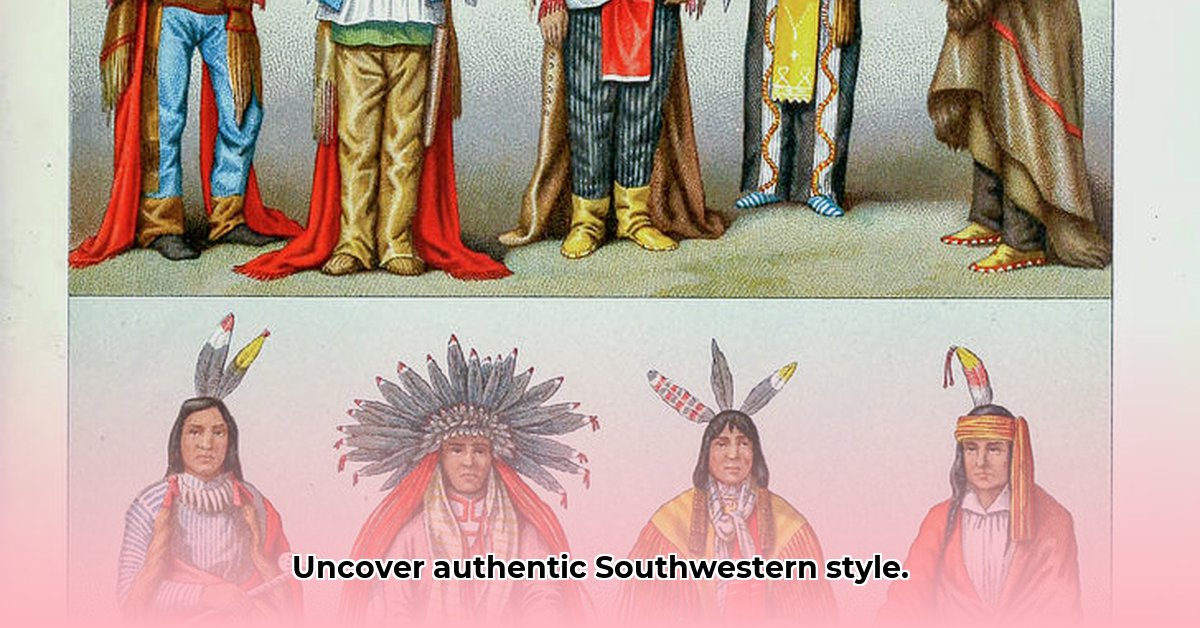Dreaming of Southwestern style with its vibrant colors and intricate patterns? These garments embody more than just fashion; they tell stories woven into the fabric itself. This guide offers a journey into the heart of Southwestern apparel, exploring its history, materials, ethical considerations, and the best places to find authentic pieces that honor tradition and contemporary trends.
Decoding Southwestern Style: A Timeless Aesthetic
Southwestern clothing transcends fleeting trends, acting as a powerful medium for cultural expression and a testament to the artistic fusion of Native American and Mexican influences. These garments represent more than mere attire; they are heirlooms, each piece resonating with the skill, history, and cultural significance passed down through generations. What are the defining elements of this unique style, and how can you incorporate it into your wardrobe with both knowledge and respect?
From Ancient Roots to Modern Runways: A Historical Tapestry
The alluring character of Southwestern apparel is rooted in a rich historical blend, where Native American and Mexican traditions intertwine. The color palettes are striking, often featuring earthy tones drawn from the desert landscape, punctuated by vibrant jewel tones inspired by sunsets and native flora. The textiles are adorned with intricate patterns, featuring iconic designs and symbols rooted in nature and ancient beliefs. These garments were originally designed for durability and functionality in a demanding desert environment. Many traditional designs incorporate motifs with deep cultural meaning, making each piece a wearable artifact emphasizing the remarkable skill and enduring quality of the craftsmanship.
Materials and Methods: Tradition Meets Innovation
Southwestern design carefully selects high-quality natural fibers, reflecting an enduring respect for tradition and an understanding of the Southwestern climate. Breathable cotton is a staple, alongside the warmth and durability of wool, especially Pendleton wool, a fabric deeply interwoven with the region’s heritage. Supple, durable leather, often beautifully aged, adds texture and character. Skilled artisans lovingly handcraft some pieces using techniques passed down through generations, preserving these artistic legacies. Many garments are also produced on a larger scale, broadening the accessibility of Southwestern style while capturing the essence of the original designs. This duality caters to diverse tastes and budgets, upholding the spirit of the tradition.
Contemporary Interpretations: Bridging Heritage and Modernity
Modern designers skillfully reimagine classic Southwestern styles, crafting pieces that resonate with contemporary tastes while paying homage to their origins. This demands a delicate balance: respecting the cultural significance of the designs while adapting them for the modern world. Some designers collaborate directly with Native American and Mexican artisans, ensuring authenticity and supporting the economic vitality of these communities. Others meticulously study historical patterns and techniques, striving for authenticity and cultural sensitivity in their interpretations. How do designers successfully strike the ideal balance between innovation and cultural preservation when reinterpreting traditional designs?
Navigating Challenges and Opportunities: The Southwestern Fashion Landscape
The Southwestern clothing industry faces notable challenges, with cultural appropriation being a core concern. It’s essential to differentiate between genuine appreciation and disrespectful misuse of cultural symbols by ensuring that the context and meaning are fully understood. Ethical and sustainable production is also paramount. Designers are increasingly embracing eco-friendly practices, utilizing organic materials, and upholding fair labor standards. How can the industry achieve sustainable growth that empowers artisans, protects cultural heritage, and preserves the integrity of Southwestern style? The answer hinges on pioneering solutions that respect cultural boundaries, support local economies, and promote responsible production practices.
Ethical Shopping: A Guide to Authentic Southwestern Finds
Ready to embrace the beauty and storied history of authentic Southwestern clothing? Discover unique, ethically produced pieces through these avenues:
-
Artisan Markets and Festivals: Directly support artisans by visiting local markets and festivals. Experience the vibrant atmosphere, connect with the creators, and learn about their craft.
-
Independent Boutiques: Explore local boutiques specializing in handcrafted goods, supporting local designers committed to ethical and sustainable practices.
-
Museum Shops: Browse museum shops that feature authentic Southwestern crafts and support the preservation of cultural heritage.
-
Online Retailers with a Conscience: Many online platforms offer Southwestern clothing. Prioritize those that transparently detail their sourcing, production methods, and commitment to ethical principles.
Choosing authentic Southwestern clothing from reputable sources safeguards cultural heritage, empowers artisans, and honors the intricate history and craftsmanship embedded in each piece. By making informed purchases, you contribute to ethical business practices and help preserve a precious part of American heritage.
Sustainable Sourcing: Preserving Tradition and Protecting the Planet
Key Takeaways:
- Southwestern fashion skillfully blends Native American and Mexican traditions with modern designs.
- Ethical sourcing prioritizes sustainable materials and fair labor practices.
- Understanding the historical context and cultural relevance of materials is paramount.
Unveiling Southwestern Heritage: A Story Woven in Time
Southwestern style represents a tradition of artistry passed down over generations. This rich history highlights not only a design aesthetic, but also a cultural connection and a relationship with the land. How do we honor this legacy while also meeting modern design needs? Ethically sourcing materials necessitates a deep understanding of what sustainability means in the context of textile production. What factors should define “sustainable” when considering your choices?
The Fabrics We Choose: A Commitment to Responsibility
The materials utilized tell a tale of their own. Traditional Southwestern clothing features fibers prominent in the local landscape and culture. The choices of cotton, wool, and leather present a variety of options for artisans and consumers. Ethical sourcing also demands that we evaluate both the origins of these materials and the ways they are manufactured. By choosing organic cotton, for example, we can reduce environmental impact. Sourcing responsibly produced wool ensures that animals are treated humanely. Sustainably sourced and tanned leather is also an important consideration.
Partnering With Communities: A Collaborative Approach
Working with skilled artisans and community cooperatives reinforces traditional techniques and empowers local economies. The approach taken to sourcing materials for Southwestern fashion design should always include fair wages, safe working conditions, and respect for cultural heritage are critical.
Facing Ethical Challenges: Finding Solutions
Scaling production can be an obstacle when prioritizing ethical practices. We must find creative solutions to balance the demands of the market with our commitment to fair wages and sustainability. Transparency is also vital, and traceability ensures verifiable claims of ethical sourcing, thereby building consumer trust. Responsible designers are committed to the cultural significance of designs and patterns, and they take responsibility for avoiding cultural appropriation.
Looking Forward: Continuing Commitment
The future success of Southwestern fashion relies on ongoing collaboration between designers, artisans, and consumers. A continued commitment to sustainable practices and transparency will ensure the longevity of this rich design tradition.
Retailers With Integrity: Your Guide to Authentic Southwestern Clothing
Key Takeaways:
- The Native American-inspired clothing market is growing, reflecting consumer interest in culturally relevant and sustainable apparel.
- Businesses like Navajo Spirit showcase the potential for blending heritage with eco-conscious practices.
- Authenticity and fair compensation for Indigenous communities are critical when seeking authentic retailers.
Southwestern Style: A Rich And Interesting History
Southwestern fashion is a vibrant tapestry woven from centuries of history and artistry. Native American and Mexican traditions are combined in rich textures and colors. Painstaking handcraftsmanship and storytelling are embedded in each carefully created stitch.
Ethical Materials: Respecting Heritage While Protecting the Planet
Authentic Southwestern clothing often takes advantage of natural materials like cotton and Pendleton wool. Retailers committed to the region’s heritage prioritize sustainable practices while carefully combining traditional techniques with modern processes. Retailers committed to these values are transparent in their sourcing and production.
Tradition With a Modern Twist: Innovation and Cultural Sensitivity
Contemporary designers are reinterpreting classic Southwestern styles, adding modern design elements while staying true to the original pieces. Designs that tastefully update traditional motifs demonstrate the enduring appeal of Southwestern fashion. By taking bold risks that also prioritize original art, brands can stay true to the traditions of the region.
Navigating the Market: Challenges and Opportunities
Cultural appropriation remains a serious concern in the Southwestern fashion market. Accurately representing the complex history of the region requires thoughtfulness and sensitivity. Retailers should ensure fair wages, safe working conditions, and environmental sustainability throughout the supply chain.
Your Guide to Ethical Shopping: Seek Authenticity
Carefully curated online retailers and boutiques that focus on transparency are a great starting point. Seek brands that openly share their production processes and highlight their commitment to fair trade practices. By directly supporting transparent and ethical businesses, consumers can help spread awareness of these important businesses. Research and ethical purchasing is key to finding Retailers With Integrity: Your Guide to Authentic Southwestern Clothing.
Preserving Heritage: Ethical Sourcing and Sustainable Practices in Southwestern Fashion
Key Takeaways:
- The Southwest’s textile heritage faces modern ethical and environmental challenges.
- Prioritizing cultural sensitivity and minimizing environmental impact are paramount.
- Sustainable materials and fair labor practices are essential.
Appreciating the Past: Understanding Our Roots
Southwestern fashion represents a vibrant cultural heritage, and we have a responsibility to preserve this tradition as we address these challenges. How can we navigate modern ethical and environmental concerns while still supporting the craft?
Ethical Materials: Environmentally Conscious Fibers
Historically, Southwestern clothing relied on cotton, wool, and locally-sourced dyes. Designers committed to sustainability produce time-honored materials with sustainable production techniques and environmentally friendly dyes.
Traditional Artistry: Ethical Standards
Traditional Southwestern pieces are often handcrafted, reflecting a deep connection to cultural heritage. As the demand for accessibility grows, how can we minimize the impact on artisan livelihoods?
Modern Designs: Innovation and Tradition
Modern Southwestern fashion fuses ancient techniques with contemporary aesthetics. Before making a purchase, consumers should confirm that the brands they shop with are truly committed to long-term sustainability.
Navigating a Complex Landscape: Ethical and Sustainability Commitments
Cultural appropriation is a serious concern, and brands should create designs with sensitivity and collaboration. To ensure transparency and accountability,
















